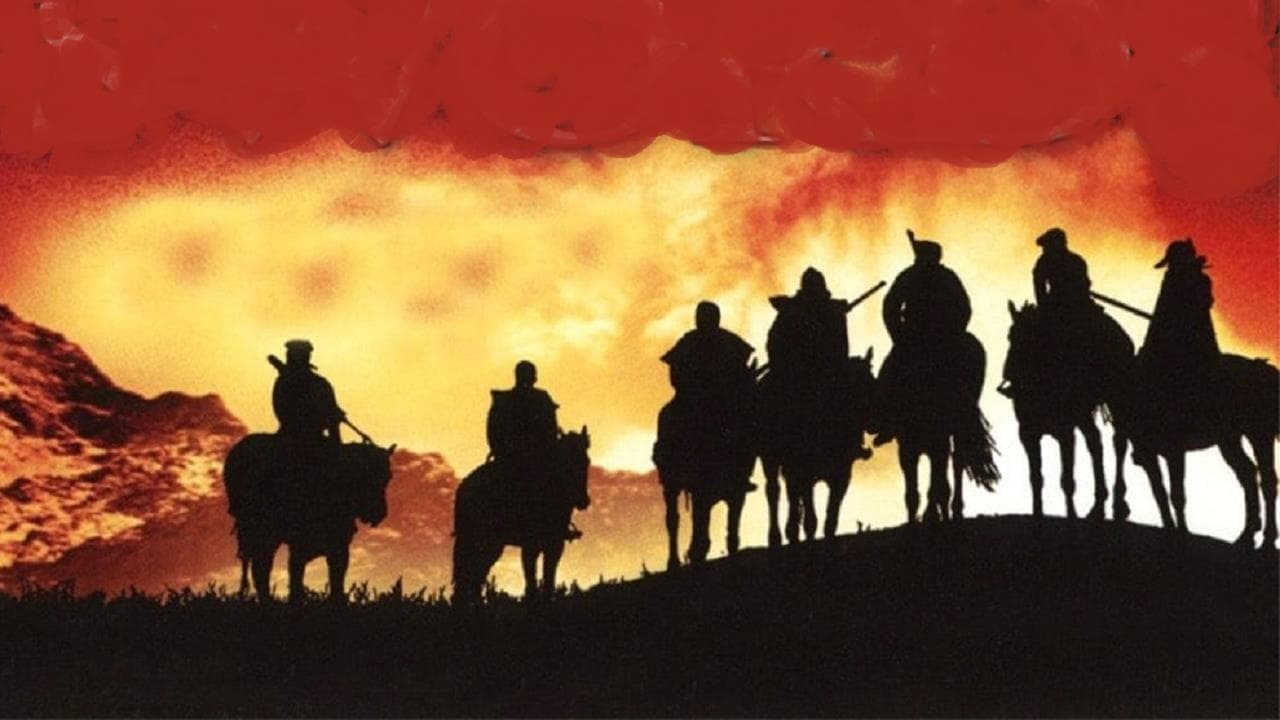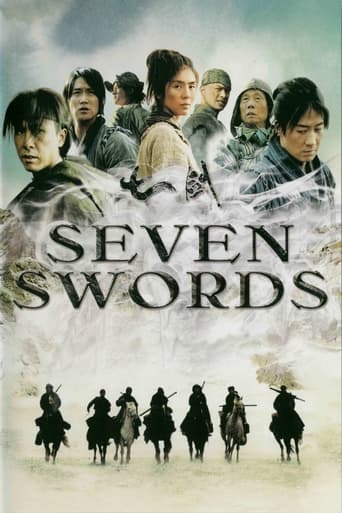Thehibikiew
Not even bad in a good way
Libramedi
Intense, gripping, stylish and poignant
Dorathen
Better Late Then Never
Dynamixor
The performances transcend the film's tropes, grounding it in characters that feel more complete than this subgenre often produces.
kluseba
Tsui Hark usually happens to be a solid venue when it comes to direct artistic, epic and philosophic Chinese movies as he proved in unforgettable classics such as "A Chinese Ghost Story" or "Once Upon A Time In China" to only name the most famous movie series he has been a part of.Sadly, in opposition to many favourable reviews, I must say that this movie happens to be the worst I've known from him. The whole story is confusing and not well told. The seven main characters are introduced in strange ways. Some get a lot of screening time, others just appear and are a part of the group without getting any development at all. That's why it's difficult to always understand who is who and who is doing what for which reason. Many useless flashbacks make the whole thing even worse.The battle scenes in this movie are extremely incoherent. Some of them are truly beautiful, well filmed and prove of great aesthetics. The first big battle introduces for example intriguing main villains and a lot of original arms. Other fighting scenes are just overlong while nothing really happens, for example the last fight with the main villain. The movie kicks off very promising and the first fifteen minutes are quite perfect but the film quickly decreases and even the open ending is a letdown.The acting is also strange. Some characters show so many emotions that they don't look profound but like ridiculous caricatures. The scenes with the hysteric Korean woman for example are funny first but get truly annoying after a while. The love scenes and relationship in this movie are all but credible. Many critics say the characters have a lot of depth but apart of the first three or four actors out of seven we're introduced to, this is not true in my humble opinion. Half of the seven main characters are rather faceless, the villagers are too stereotypical and the villains faceless or just out of their minds. The most intriguing character which is the evil woman with the Gothic look, dies way too soon in this movie. I must also criticize Donnie Yen who seems to be the new martial arts star from China. He still has a lot to do to get even close to a Bruce Lee, Ti Lung, Jackie Chan, Leslie Cheung or Jet Li to only name a few. I think he is quite overrated just as the "Ip Man" films with him.The movie also has its positive sides. As I said, the beginning is very strong. The filming is well done as the camera angles are well chosen, the choreography as well as images are very precise and the authentic costumes are flawless. In the beginning, the movie also works a lot with colours, for example by adding a darker tone to the red colours by making the surroundings look grey in the first brutal battle scenes. This stylistic elements fits well to the atmosphere but the movie strangely stops to employ this intriguing technique after a while. The ideas and the precision both decrease after a while even though the whole thing still remains somewhere between solid to good.In the end, the few positive aspects don't justify to watch this film that is a big letdown coming from a brilliant director as Tsui Hark usually is without a doubt. The movie had too many lengths in the fighting scenes but also a lack of depth concerning too many characters. Critics are very controversial and you should be warned before you try this one out but I definitely wouldn't recommend you to watch this mediocre effort.
Geschichtenerzaehler
I like martial arts films. I really do. And often I forgive them their silly stories and lack of logic. But not this time. This wannabe epic fails at everything.For some reason, probably lost in translation, the Chinese emperor wants to eliminate all martial artists and has put a bounty on all of them. Some kind of wild mercenary army using cheap prop mechanical weapons erases entire villages on its path claiming a bounty for each slain person. Obviously imperial officers are pretty dumb...We soon learn about an endangered village which is in dire need of help. this part of the script is basically a rip off of Seven Samurai. Unfortunately the villagers personalities are so off-putting, that one doesn't care about them at all. They are just a bunch of hate filled, xenophobic idiots. I won't go into the confusing, paradox details here.Somehow they learn about 7 sword wielding heroes and send for them for help. Said heroes reside on a cold, snow covered mountain top in actual holes in the rock. There is absolutely no clue what the heck they are doing up there all day.Some troubles later the heroes join the villagers in their task to defend their homes. I don't really recall any good or entertaining martial arts scenes in the middle part of the movie.Now the movie begins to drag on. Slowly. Very, very slowly. It tries to give every(!) character an elaborate, cliché ridden melodramatic background. It ties hard. Way too hard. Lengthy landscape shots dubbed with overly emotional music accompany these parts. The only interesting character in the entire movie happens to be the main villain. He isn't nice or charismatic, but he makes up for it with insanity, which sadly is the only entertaining thing you will witness for about 120 minutes.At the end there's finally a good fight scene. About 2 Minutes long. That's all. I had to endure 150 Minutes of terrible movie making getting there. Absolutely not worth the time.
thisissubtitledmovies
excerpt, more at my location - Given Tsui Hark's lengthy CV, expectations are understandably high for any of his films, and Seven Swords is no exception. An explosion of unlikely influences, a celebration of genre, a clash of cultures, it should be a multifaceted film wrapped up in layers of meaning. But whether Hark satisfies the challenge that he has set himself remains debatable.Seven Swords is an admirably accessible beginner's guide to Eastern cinema, but for most, it has opened the doors far too wide and the substance has fallen out. Perhaps original and bold for fearless genre experimentation, and certainly striking for its imagery, it offers nothing to challenge the viewer or even engage them. Placing audiences in an ambiguous position, it makes for uncomfortable viewing - is Hark sharing a story with them, or just patronising them? In either case, more fool him: boredom is inevitable in this painful and over budgeted mess.
winner55
Wow. This film starts out so well and ends up sssooooo wrong! The opening sequences of the film are painfully violent and beautifully filmed, suggesting that we are in for a ride through the mythic landscape of an ancient warring China. Theis promise starts to slip away during a journey to the Mountain of Heaven t find the fabled swordsmen there, when the continuity begins to crumble. Well, Chinese narratives tend to have somewhat different sense of continuity than those in the West, so I continued to hope for the best. There followed a nice fight sequence to save a village threatened by an Imperial army. There was a pretty decent follow-up as the swordsmen met the army in its own lair.Perhaps the film should have ended there, because it went straight to hell thereafter.The middle is entirely muddled with turgid, and for the most part unnecessary, dramatics and melodramatic plot twists. Donnie Yen's character especially gets convoluted beyond recognition. The villain remains fascinating throughout, but he seems to have wandered in from another film, "Burning Paradise," and he keeps looking for the director of that great film, Ringo Lam, who unfortunately never shows up.The film never recovers, and the grand finale is wholly unsatisfying.The problem seems to be a failure on director Tsui's part to decide whether he wants to make a realistic epic or a grand operatic myth. Lam, in "Burning Paradise," was able to merge the two only because he allowed the conventions of the martial arts film to determine the limits of the realism of his depiction of the myth. Thus the characters and their actions retain a larger-than-life feel throughout the grisliest realism in the depiction of the violence.But Tsui's characters never rise to the level of the myth of their origins. Thus they feel limited not by convention but by physics and psychology. That might work in another film; while watching the final fight between Honglei Sun's villain and Donny Yen, I was reminded of the brilliant duel between Yen and Jet Li in another Tsui Hark film, "Once Upon a Time in China II." But the contest in "Seven Swords" seems so small in comparison; we feel no investment in the character of either fighter here.Such a promise, so poorly realized!

